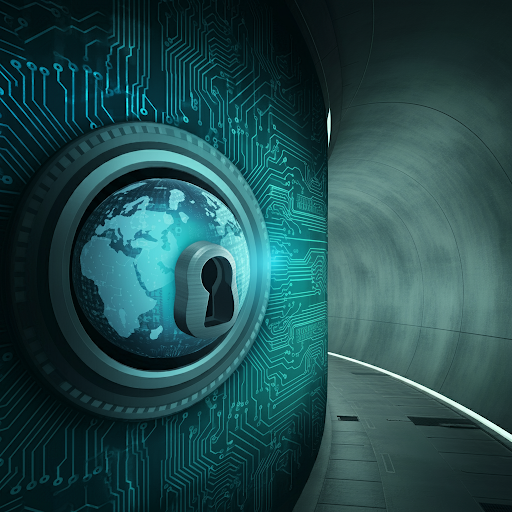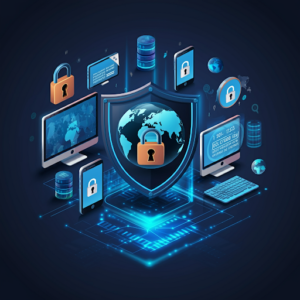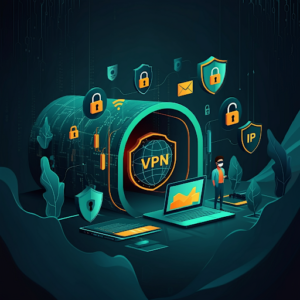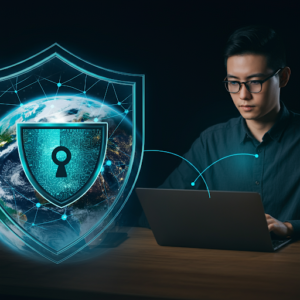Chuong.vn here! Today, we’re diving into the world of VPNs – a crucial tool for your online security and privacy. Let’s explore how VPNs work and why you might need one in your digital life.
What is a VPN and How Does It Work?
A Virtual Private Network (VPN) is like a secret tunnel for your internet connection. It encrypts your data and routes it through a secure server, making it nearly impossible for anyone to peek at your online activities.
Here’s a simple breakdown of how a VPN works:
- You connect to a VPN server
- Your data gets encrypted
- Your encrypted data travels through the VPN’s secure tunnel
- The VPN server decrypts your data and sends it to its final destination
This process masks your real IP address and location, adding an extra layer of privacy to your online presence.
The Benefits of Using a VPN for Online Security
Now, you might be wondering, “Why should I bother with a VPN?” Well, let me share some compelling reasons:
- Enhanced Privacy: A VPN hides your IP address, making it harder for websites, advertisers, and potential hackers to track your online activities.
- Secure Public Wi-Fi Usage: When you’re working from a cafe or using airport Wi-Fi, a VPN encrypts your data, protecting you from potential eavesdroppers on public networks.
- Access to Geo-restricted Content: VPNs can help you bypass geographical restrictions on streaming services or websites.
- Protection from ISP Tracking: Your Internet Service Provider can’t see what you’re doing online when you use a VPN.
These benefits make VPNs an essential tool for anyone concerned about their online privacy and security.
Types of VPNs: Remote Access vs. Site-to-Site
Not all VPNs are created equal. Let’s compare two main types:
- Remote Access VPNThis is the type most individual users are familiar with. It allows you to connect to a secure network from anywhere in the world. Perfect for remote workers or travelers!
- Site-to-Site VPNThis type is mainly used by businesses to connect multiple office locations securely. It’s like having all your offices on the same local network, even if they’re spread across different countries.
For most of us, a Remote Access VPN is what we need for personal use. But it’s good to know the difference!
How to Choose the Right VPN for Your Needs
Choosing a VPN can feel overwhelming with so many options out there. Here are some key factors to consider:
- Security Features: Look for strong encryption (AES-256 is the gold standard) and a no-logs policy.
- Speed: A good VPN shouldn’t significantly slow down your internet connection.
- Server Locations: More server locations give you more options for accessing geo-restricted content.
- Price: While free VPNs exist, they often come with limitations. A paid VPN is usually worth the investment for better security and features.
- User-Friendly Interface: Choose a VPN that’s easy to set up and use, especially if you’re not tech-savvy.
Remember, the best VPN for you depends on your specific needs and usage patterns.
When Should You Use a VPN?
While it’s great to use a VPN all the time, here are some situations where it’s particularly important:
- When Traveling: Protect your data when using unfamiliar networks in hotels or airports.
- Working Remotely: Secure your connection when accessing work-related information from outside the office.
- Using Public Wi-Fi: Always use a VPN when connecting to public Wi-Fi hotspots.
- Accessing Sensitive Information: When banking online or accessing other sensitive data, a VPN adds an extra layer of security.
These are just a few examples. As you become more comfortable with your VPN, you might find yourself using it more frequently.
Common VPN Mistakes and How to Avoid Them
Even with the best intentions, it’s easy to make mistakes when using a VPN. Here are some common pitfalls and how to avoid them:
- Using a Free VPN: While tempting, free VPNs often have questionable privacy policies and may sell your data. Stick to reputable, paid services.
- Forgetting to Turn It On: Make it a habit to turn on your VPN before you start browsing, especially on public Wi-Fi.
- Ignoring VPN Logs: Choose a VPN with a strict no-logs policy to ensure your data isn’t being stored.
- Not Updating Your VPN: Keep your VPN software updated to ensure you have the latest security features and bug fixes.
By avoiding these mistakes, you’ll get the most out of your VPN and keep your online activities secure.
The Future of VPNs in Our Digital World
As our lives become increasingly digital, VPNs are likely to play an even more crucial role in the future. Here’s what we might expect:
- Integration with IoT Devices: VPNs may become standard for securing smart home devices.
- Advanced Encryption: As quantum computing advances, VPNs will need to evolve to provide even stronger encryption.
- Increased Regulation: We may see more government regulations around VPN usage and providers.
- Better Performance: Future VPNs are likely to offer faster speeds and more seamless experiences.
The bottom line is that as long as online privacy and security remain concerns, VPNs will continue to be an essential tool in our digital arsenal.
Conclusion
VPNs are more than just a tech buzzword – they’re a crucial tool for protecting your online privacy and security. By understanding how they work and how to use them effectively, you’re taking a significant step towards a safer online experience.
Remember, the internet can be a wild place, but with the right tools and knowledge, you can navigate it safely and confidently. So why not give a VPN a try? Your future self might thank you for taking this step towards better online security!
Stay safe out there, and happy browsing!
Chuong.vn signing off. If you found this article helpful, don’t forget to share it with your friends and family. After all, everyone deserves to feel secure online!




